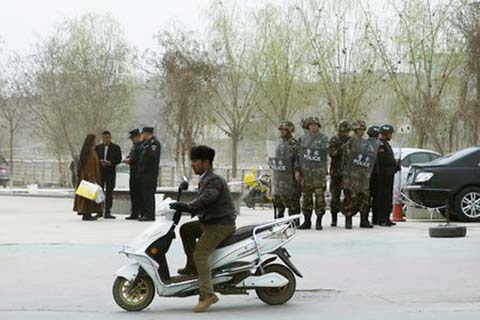
Reuters, Beijing :
The Turkic mostly Muslim Uighur minority in China’s Xinjiang region face arbitrary detentions, daily restrictions on religious practice and “forced political indoctrination” in a mass security crackdown, Human Rights Watch said on Monday.
The United Nations human rights panel said in August that China is believed to be holding up to 1 million ethnic Uighurs in a secretive system of “internment camps” in Xinjiang, in China’s far west, where they undergo political education.
Beijing has denied that such camps are for “political education” and says they are instead vocational training centers, part of government initiatives to bolster economic growth and social mobility in the region.
China has said that Xinjiang faces a serious threat from Islamist militants and separatists who plot attacks and stir up tensions between Uighurs who call the region home and the ethnic Han Chinese majority.
Uighurs and other Muslims held in the camps are forbidden from using Islamic greetings, must learn Mandarin Chinese and sing propaganda songs, according to a report by Human Rights Watch based on interviews with five former camp detainees.
People in Xinjiang with relatives living abroad in one of 26 “sensitive countries”, including Kazakhstan, Turkey and Indonesia, have been targeted by the authorities and are often held for several months, without any formal procedure, the group said.
Punishments for refusing to follow instructions in the camp could mean being denied food, being forced to stand for 24 hours or even solitary confinement, it said.
China foreign ministry spokesman Geng Shuang declined to give a detailed response to the report and said that Human Rights Watch was a group “full of prejudice” against China that distorts facts.
Measures in Xinjiang aim to “promote stability, development, unity and livelihoods”, while also cracking down on “ethnic separatism and violent terrorist criminal activities”, he told a regular briefing.
Security conditions in Xinjiang outside the camps had also intensified markedly and now bear “a striking resemblance to those inside”, Hong Kong-based Human Rights Watch researcher Maya Wang said, based on interviews with 58 former Xinjiang residents now living abroad.
Wang and her team only spoke with people who had left Xinjiang due to a lack of access to the region and to avoid endangering those still living there.
New security measures described by interviewees include proliferating checkpoints that make use of facial recognition technology and sophisticated police monitoring systems, such as each house having a QR code that, when scanned, shows the authorities who the approved occupants are.
Monitoring of Islamic religious practices, such as asking people how often they pray and the closure of mosques, as well as regular visits by party officials to rural parts of Xinjiang, mean that practicing Islam “has effectively been outlawed,” Wang said.
Meanwhile, Chinese authorities have drafted sweeping new regulations that would severely restrict religious content online, including images or even descriptions of religious activities from praying and chanting to burning incense.
The move comes as Beijing tightens the screws on religion, especially for followers of Islam and Christianity.
The new rules would only allow members of officially licensed organisations to post certain kinds of religious content, according to a draft document published online Monday by the bureau of religious affairs.
Individuals would be forbidden from posting photos, videos and even text related to religious activities, or sharing links related to preaching.
Organisations that break the rules could be shut down, the document said, but it did not detail penalties for individuals, beyond saying any violations would be handled “according to law”.
China’s officially atheist government is wary of any organised movements outside its own control, including religious ones, and analysts say oversight of such groups has tightened under President Xi Jinping.
While Beijing officially recognises five religions, it imposes strict controls on how they may be practised-regulating everything from who can attend services to what can be said by religious leaders.
The regulations are intended to promote “social stability” and stop religious fraud, cults and appeals to “extremism”, the document said.
The propagation of religious information within China by any “overseas individuals and organisations” would also be banned.
As written, the regulations could make it illegal to publish information about virtually any kind of religious activity-even pictures from a wedding ceremony-according to Jeremy Daum, an expert on Chinese law.
“As they currently read, the measures cast the net far too wide,” he said, adding that “even parts of traditional Chinese culture over which the Party is rightly proud will be excluded”.
The country’s top leaders recently called for religious practices to be brought in line with “traditional” Chinese values and culture, sparking concern among rights groups.
State supervision of religion has increased in a bid to “block extremism”, and in areas with significant Muslim populations authorities have removed Islamic symbols, such as crescents, from public spaces.
In the far-western region of Xinjiang, Uighurs and other Turkic Muslim minorities are harshly punished for violating regulations banning beards and burqas, and even for the possession of unauthorised Korans.
Up to a million minorities are believed to be held in extrajudicial re-education camps in Xinjiang, rights groups say.
Many of them were detained for posting “extremist” religious content-everything from Islamic State group videos to holiday greetings-on social media.

